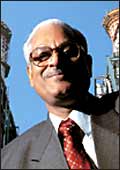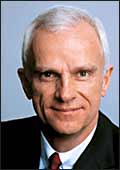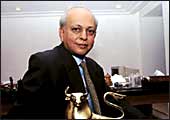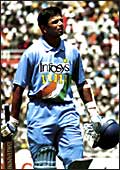|
HEADLINER
Baba Kalyani
IF YOU CAN'T BEAT
THEM, join them. Realising that China could soon be a threat
to India's auto-parts industry, Kalyani Group's Baba Kalyani has
done the smart thing. He's struck a joint venture with China's
FAW Corporation for its forgings business, which is already the
biggest in China. Bharat Forge will have a 52 per cent majority
stake in the JV, bought for an undisclosed sum, giving it access
to big vehicle manufacturers in China like Toyota and Volkswagen.
The JV has its manufacturing plant in Changchun in Northern China,
with an annual forging capacity of more than 100,000 tonnes and
a workforce of 1,700. "The JV is a step in the direction
of reiterating our strong commitment to providing world-class
forging technology to the fastest growing automotive market of
the world-China," Kalyani said in a release. Financial details
of the transaction haven't been revealed, but there's little doubt
that Bharat Forge-already the second largest forgings manufacturer
in the world-becomes an even more significant player in the industry.
-Kushan Mitra
The Gas Issue Heats Up
 |
| NTPC's C.P. Jain: Left in a lurch |
Power giant, NTPC, seemed set to drag Reliance
Industries to court after the latter said it would revise the
price and the delivery dates of gas to two NTPC power plants due
for commissioning end of 2007. "NTPC is taking legal and other
steps for enforcing the contract," Union Power Minister P.M. Sayeed
told the Rajya Sabha. In July last year, NTPC had awarded a contract
to RIL for supply of 13 million cubic metres of gas per day for
the two power plants. Apparently, while RIL is willing to sell
its own gas at the contracted $2.94 (Rs 132.30) per million BTUS
(British thermal units), it is unwilling to sell purchased gas
at the same price, since gas prices are higher than the contract
price.
BMW Sets Up Shop
 |
| BMW's Panke: It's gear 1 in India |
It's a modest beginning, but a significant move
nonetheless. Luxury car major BMW has finally decided to set up
a manufacturing plant in India at Tamil Nadu, besides a sales
subsidiary. The total investment will be Euro 20 million (Rs 110
crore), and the plant will commence production by the beginning
of 2007. To start with, the plant will assemble BMW 3 Series and
5 Series sedans, painted bodies and parts for which will be shipped
in from Europe. When fully operational, the plant will roll out
a modest 1,700 cars a year. "The Indian automobile market offers
significant growth potential in the long term. With our increased
presence there, we will be well positioned to fully tap this potential,"
BMW Chairman Helmut Panke said in statement. In 2004, BMW sold
just 100 vehicles directly in the country. But with its own sales
set-up in place, the German car maker can possibly sell hundreds
more.
NEWSMAKERS
Hemendra Kothari
 |
| Kothari: "India is
where all the action is happening" |
Is it goodbye,
Dalal Street, for one of India's best-known investment bankers?
That's unclear at this point, but what's obvious is that Hemendra
Kothari can safely pursue any ambition outside of the financial
world. He has been a big name on Dalal Street for a long time,
but now he also has the big bucks to turn, say, a full-time philanthropist,
activist (he's big time into saving tigers), or angel investor.
His deal with Merrill Lynch to sell his 50 per cent in the joint
venture DSP Merrill Lynch has fetched him a massive and surprising
$500 million (Rs 2,250 crore). He'll continue to own a 10 per
cent stake and remain Chairman of DSP Merrill Lynch (yes, the
name does't change either). "When I started my business 30
years ago, my objective was to be a leading financial services
(provider)," says Kothari. That seems to have certainly worked,
with cross-border transactions being the order of the day. "India
is where all the action is happening," he notes. As far as
the firm goes, Merrill Lynch will make an open offer for the publicly
traded shares of DSPML and also make an application for delisting
of the shares. The transaction will also entail the continuing
of DSPML Fund Managers, a wholly-owned asset management subsidiary
of DSPML, as a JV where DSPML will own 40 per cent, while Kothari
and related entities will hold the balance. But, what will DSPML
look like over time? According to Kevin V. Watts, Chairman, Merrill
Lynch International, the plan is to bring in more products and
services in future. "We have a very strong bunch of people
here and India, with its high growth rates, is a market that matters
enormously to us. The next five to 10 years will be very important
for us," he thinks. Knowing Merrill Lynch's ability to think
and execute big, no one is doubting that.
-Krishna Gopalan
NUMBERS
OF NOTE
500:
The number of Indian companies operating in the UK, either on
their own or in partnership with local companies. Nearly 400 of
these companies are in the IT sector
238,883:
The number of cases pending in various consumer courts, according
to the National Consumer Disputes Redressal Commission
87: The
number of companies with $1 billion (Rs 4,500 crore)-plus market
capitalisation, up from 76 in June 2005, when the Sensex touched
the 7,000 mark
40 million:
The number of people with AIDS worldwide, a figure similar to
the size of Spain's population. The number of HIV/AIDS cases in
India is 5.1 million, the highest in South Asia
$258.3 million
(Rs 1,162.35 crore): The amount Microsoft Corp. founder Bill
Gates pledged in October for R&D to combat malaria, including
new cash to test the world's first vaccine against the disease
$400 billion
(Rs 18,00,000 crore) and almost 5 million jobs: What the Bush
administration says the Kyoto Protocol would cost the US economy.
The protocol excludes China and India from mandatory emission
caps
$300 million
(Rs 1,350 crore): The second-largest fine in a criminal antitrust
case to be paid by Samsung Electronics Co. and its US subsidiary,
Samsung Semiconductor Inc. for price-fixing
 $50
billion (Rs 2,25,000 crore): The liability that US-based
Merck faces in about 7,000 state and federal lawsuits against
its former blockbuster painkiller Vioxx $50
billion (Rs 2,25,000 crore): The liability that US-based
Merck faces in about 7,000 state and federal lawsuits against
its former blockbuster painkiller Vioxx
$7.9 billion
(Rs 35,550 crore): The size of China's beauty industry, which
has doubled since 1998. Some 90 million urban women in China spend
10 per cent or more of their income on beauty products
$30 billion
(Rs 1,35,000 crore) each year by 2015: Indian demand for semiconductor
chips, according to SemIndia, a consortium of overseas Indians
that plans to set up a $3-billion (Rs 13,500 crore) chip manufacturing
factory in the country in which US chip-maker Advanced Micro Devices
Inc. may pick up a stake
Padding
Up For The Brand
 |
| Team India sponsor: Will
it be Infosys? |
On
the face of it, an emotional bond with technology may sound bizarre,
but that's what it biggies in the country are aiming at; to connect
with their end consumers in a way that probably seemed appropriate
only for FMCG companies so far. Companies like Infosys, Wipro
and Microsoft, reportedly, are in the race to pick up sponsorship
deals for the Indian cricket team. Cricket is the most expensive
property for any marketer today and what it delivers is a direct
and unparalleled connect with the masses. These companies, on
the contrary, operate business to business, and get more than
three-fourths of their revenues from global markets. What explains
their quest for brand recognition in a market and among a group
that's not their core audience?
According to Deepak Khosla, Senior Vice President
(Global Marketing), Patni Computer Systems, there are two main
reasons for this move. One, the heating up of competition on the
home turf, especially after the entry of the global biggies like
Accenture and IBM, who are now looking at consolidating their
position. "These companies have a strong brand appeal and,
thus, are in a better position to woo not only the prospective
employers, but also the 400-500 it customers," says Khosla.
Secondly, he says, some of the top it companies are emerging as
pressure groups, even politically. "These companies need
to work on their brand image to build a positive sentiment among
masses," Khosla adds.
For a company like Microsoft, the reasons
are different. Says Ranjivit Singh of Microsoft India: "For
our PCs and all other services, the consumer segment is growing
faster than the institutional segment. Thus, we need to tap all
consumer touch points and, hence, cricket." In a country
where cricket is religion, the men in blue make great brand ambassadors.
-Archna Shukla
NOTED
 ANNOUNCED:
By Intel, the world's largest maker of computer chips,
plans of investing more than $1 billion (Rs 4,500 crore) in India.
Of this, $800 million (Rs 3,600 crore) will go into business expansion,
mostly research, over five years, and another $250 million (Rs
1,125 crore) will be spent on setting up a venture capital (VC)
fund. Intel has invested $700 million (Rs 3,150 crore) in the
past 10 years on setting up a base here and employs 3,000 people.
Besides, it has invested $100 million (Rs 450 crore) in VC funding
in around 40 companies, including NIIT, Sasken, FutureSoft, Nipuna
and Tejas. ANNOUNCED:
By Intel, the world's largest maker of computer chips,
plans of investing more than $1 billion (Rs 4,500 crore) in India.
Of this, $800 million (Rs 3,600 crore) will go into business expansion,
mostly research, over five years, and another $250 million (Rs
1,125 crore) will be spent on setting up a venture capital (VC)
fund. Intel has invested $700 million (Rs 3,150 crore) in the
past 10 years on setting up a base here and employs 3,000 people.
Besides, it has invested $100 million (Rs 450 crore) in VC funding
in around 40 companies, including NIIT, Sasken, FutureSoft, Nipuna
and Tejas.
FILED: Lawsuits,
in the Delhi High Court, by Suzuki Motor Corporation against 10
companies in various businesses like finance, textiles, spinning
and weaving, for using the Suzuki brand without permission.
MOVING UP: India
in the global M&A ranking, to 17th slot from 29th, according
to Deloitte Touche Tohmatsu. Between January and November this
year, 1,013 M&A deals were struck in the country. The value
of the deals is put at $18.2 billion (Rs 81,900 crore) in the
first 11 months, against $6.1 billion (Rs 27,450 crore) during
the corresponding period last year.
 REDESIGNED:
Indian Airlines' brand name and logo. IA has dropped the
word Airlines from its name. Now, the name 'Indian' would appear
on both sides of the tail of all IA aircraft in English and Devnagiri
script. A graphic depiction of a partly-visible blue "wheel"
inspired by the Sun Temple at Konark on the Orange tail is meant
to symbolise timeless motion and trust that has stood the test
of time. The latest move comes at a time when the state-owned
carrier is preparing to receive 43 brand new Airbus aircraft besides
leasing A319s, which will fly between Indian cities for the first
time. REDESIGNED:
Indian Airlines' brand name and logo. IA has dropped the
word Airlines from its name. Now, the name 'Indian' would appear
on both sides of the tail of all IA aircraft in English and Devnagiri
script. A graphic depiction of a partly-visible blue "wheel"
inspired by the Sun Temple at Konark on the Orange tail is meant
to symbolise timeless motion and trust that has stood the test
of time. The latest move comes at a time when the state-owned
carrier is preparing to receive 43 brand new Airbus aircraft besides
leasing A319s, which will fly between Indian cities for the first
time.
LOWERED: The
interest rate for Employment Provident Fund, to 8.5 per cent for
2005-06. This is 100 basis points lower than the 9.5 per cent
demanded by trade unions, but 50 basis points higher than the
8 per cent recommended by the Central Board of Trustees' Finance
and Investment Committee.
A
Media Baron's Unlikely Business Model
 |
| BCCL's Samir Jain |
This year, Bennett,
Coleman & Co, which publishes newspapers such as The Times
of India and The Economic Times, signed more than three-dozen,
equity-for-advertisement deals with small and medium-sized companies.
The barter deals involve consistent promotion of the said companies
across all BCCL media platforms, which include newspapers (Hindi
and English), radio (Radio Mirchi), internet portal (Indiatimes),
and soon-to-be-launched news channel, Times Now. "Times media
platforms are far too expensive for small and medium companies"
that, however, need "good publicity" to match their
growth, says a top source in BCCL. The deals have scandalised
the media circles but, for now, BCCL doesn't seem to care.
-Archna Shukla
TV
TODAY IN THE US
 |
| TV Today on Nasdaq Tower |
TV Today, part of the
India Today group that also publishes Business Today, launched
its two 24-hour news channels-Aaj Tak and Headlines Today-in the
US on December 1. The group has tied up with Echostar DISH Network,
which caters to around 250,000 South Asian homes. "Aaj Tak
and Headlines Today have been able to successfully widen the viewership
base for news in India," says Aroon Purie, Chairman &
Managing Director of TV Today. "This step will further widen
the base for Indian news internationally." Both Aaj Tak and
Headlines Today will be pay channels in the US, unlike India where
these are free-to-air. "We expect the new venture to deliver
5 per cent to our current topline," says G. Krishnan, CEO,
TV Today. Its next stop: the UK and Canada.
-Archna Shukla
NGEF:
Reviving A Dead Horse
 |
| NGEF: Prime property |
Old madras road on
Bangalore's eastern periphery is among the most sought-after real
estate locations in India's Silicon City. It's no wonder then
that a defunct state-owned unit occupying 143 acres in this area
is attracting spectacular bids for its property. Melmont Constructions,
a joint venture between Purvankara Projects and Sobha Developers,
bid Rs 1,327 crore for New Government Electric Factory (NGEF),
and was topped by a consortium comprising Prestige Constructions-HDFC-Reliance
that bid (in five separate parcels) Rs 1,600 crore. Developer
interest in NGEF is in stark contrast to its current state. It
has been ordered closure by the Karnataka High Court and all but
200 of its 2,000 employees have opted for VRS. Yet, the state
government wants to revive NGEF after its Rs 68 crore debt is
paid off. "We are looking at several options on how to (revive
NGEF), including moving the company outside Bangalore," says
Karnataka's industry minister, P.G.R. Sindhia. Bad idea. Companies
like ABB, Schneider and BHEL compete in the space. Here's a better
idea for the state government: Sell NGEF and invest the money
in Bangalore's infrastructure.
-Rahul Sachitanand
|








 $50
$50
 ANNOUNCED:
ANNOUNCED:
 REDESIGNED:
REDESIGNED:


